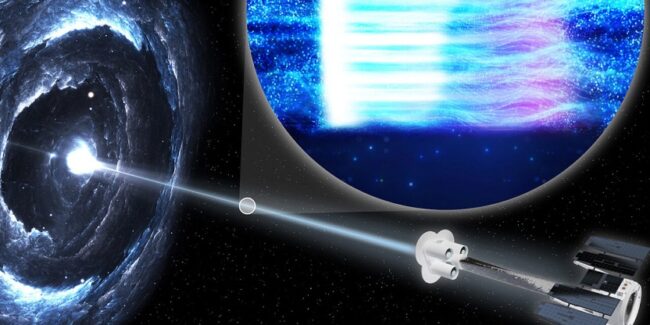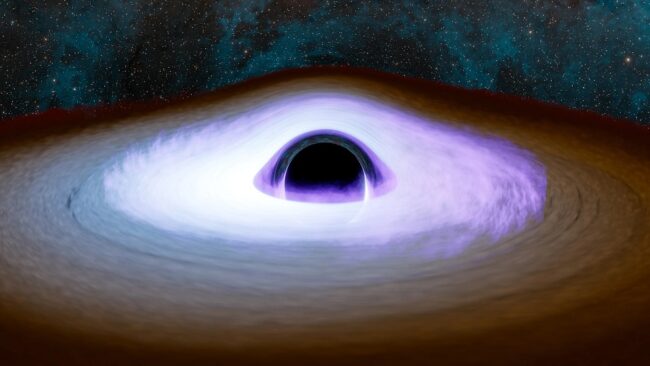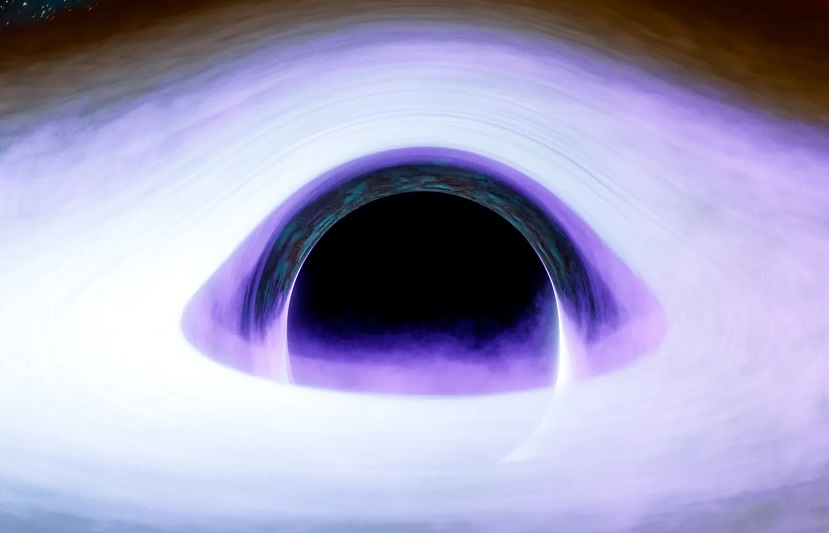New findings using data from NASA’s IXPE (Imaging X-ray Polarimetry Explorer) mission offer unprecedented insight into the shape and nature of a stru
New findings using data from NASA’s IXPE (Imaging X-ray Polarimetry Explorer) mission offer unprecedented insight into the shape and nature of a structure important to black holes called a corona.
A corona is a shifting plasma region that is part of the flow of matter onto a black hole, about which scientists have only a theoretical understanding. The new results reveal the corona’s shape for the first time, and may aid scientists’ understanding of the corona’s role in feeding and sustaining black holes, reported NASA.

Many black holes, so named because not even light can escape their titanic gravity, are surrounded by accretion disks, debris-cluttered whirlpools of gas. Some black holes also have relativistic jets, ultra-powerful outbursts of matter hurled into space at high speed by black holes that are actively eating material in their surroundings.
Less well known, perhaps, is that snacking black holes, much like Earth’s Sun and other stars, also possess a superheated corona. While the Sun’s corona, which is the star’s outermost atmosphere, burns at roughly 1.8 million degrees Fahrenheit, the temperature of a black hole corona is estimated at billions of degrees, reported NASA.
Astrophysicists previously identified coronae among stellar-mass black holes –those formed by a star’s collapse– and supermassive black holes such as the one at the heart of the Milky Way galaxy.

“Scientists have long speculated on the makeup and geometry of the corona,” said Lynnie Saade, a postdoctoral researcher at NASA’s Marshall Space Flight Center in Huntsville, Alabama, and lead author of the new findings. “Is it a sphere above and below the black hole, or an atmosphere generated by the accretion disk, or perhaps plasma located at the base of the jets?”, reported NASA
Enter IXPE, which specializes in X-ray polarization, the characteristic of light that helps map the shape and structure of even the most powerful energy sources, illuminating their inner workings even when the objects are too small, bright, or distant to see directly. Just as we can safely observe the Sun’s corona during a total solar eclipse, IXPE provides the means to clearly study the black hole’s accretion geometry, or the shape and structure of its accretion disk and related structures, including the corona, reported NASA.

“X-ray polarization provides a new way to examine black hole accretion geometry,” Saade said. “If the accretion geometry of black holes is similar regardless of mass, we expect the same to be true of their polarization properties.”
IXPE demonstrated that, among all black holes for which coronal properties could be directly measured via polarization, the corona was found to be extended in the same direction as the accretion disk, providing, for the first time, clues to the corona’s shape and clear evidence of its relationship to the accretion disk. The results rule out the possibility that the corona is shaped like a lamppost hovering over the disk, reported NASA.

This illustration of material swirling around a black hole highlights a particular feature, called the “corona,” that shines brightly in X-ray light. In this depiction, the corona can be seen as a purple haze floating above the underlying accretion disk, and extending slightly inside of its inner edge. The material within the inner accretion disk is incredibly hot and would glow with a blinding blue-white light, but here has been reduced in brightness to make the corona stand out with better contrast. Its purple color is purely illustrative, standing in for the X-ray glow that would not be obvious in visible light. The warp in the disk is a realistic representation of how the black hole’s immense gravity acts like an optical lens, distorting our view of the flat disk that encircles it.
The research team studied data from IXPE’s observations of 12 black holes, among them Cygnus X-1 and Cygnus X-3, stellar-mass binary black hole systems about 7,000 and 37,000 light-years from Earth, respectively, and LMC X-1 and LMC X-3, stellar-mass black holes in the Large Magellanic Cloud more than 165,000 light-years away. IXPE also observed a number of supermassive black holes, including the one at the center of the Circinus galaxy, 13 million light-years from Earth, and those in galaxies NGC 1068 and NGC 4151, 47 million light-years away and nearly 62 million light-years away, respectively.
Stellar mass black holes typically have a mass roughly 10 to 30 times that of Earth’s Sun, whereas supermassive black holes may have a mass that is millions to tens of billions of times larger. Despite these vast differences in scale, IXPE data suggests both types of black holes create accretion disks of similar geometry, as reported by NASA.
All Credit To: NASA/Caltech-IPAC



COMMENTS